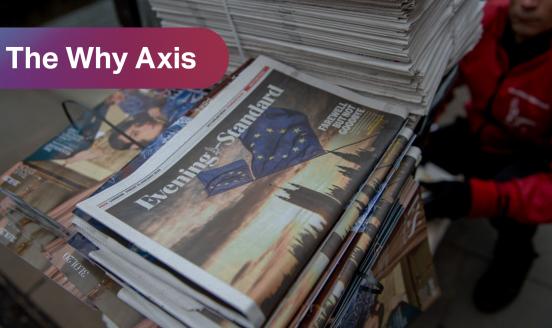The Jury is Still Out on the European Union's Crisis Performance
In his January column, Senior Resident Fellow Nicolas Véron examines the European Union's performance in reacting to the global economic crisis. He explains that while the EU has had major difficulties in the wake of the crisis, there have been several positives: the European Central Bank has been seen as a key player and has restored stability to the markets; the EU is creating the world's first supranational financial authorities; and the euro has withstood prophecies of its inevitable break-up. Véron adds, however, that the biggest challenges still lie ahead.
Few political arrangements have been as tested by the economic and financial crisis as the European Union. The EU is a relatively recent endeavor, with its origins in 1950. It has developed over a period of peace and near-uninterrupted growth. But many have predicted that faced with a big enough shock, European nation-states would reassert their sovereignty and fracture the Union.
According to the most dire predictions, the crisis may cause the EU and its offshoot the euro to unravel partly or completely – as when the oil shocks of the 1970s led to what was then labelled ‘eurosclerosis.’ Indeed, by many measures, the current economic turmoil is more severe than it was then. Since the crisis started in August 2007 Brussels has been hit by plenty of bad news.
The European Commission’s deregulatory agenda, pursued at least since Charlie McCreevy became Commissioner for financial services in 2004, has been implicated in the lapses in public supervision that enabled European banks to invest heavily in opaque US property-based assets, and consequently to suffer heavy losses when the subprime bubble burst.
When the crisis became acute in late September 2008 following the collapse of Lehman Brothers, the lack of coherence of member states’ responses led to questions about the very relevance of the Union. Shortly thereafter, calls by the Commission for a coordinated fiscal stimulus were ostensibly ignored by national capitals.
Attempts by governments to protect “national champions” and to force them to invest at home rather than elsewhere in Europe, in banking and other sectors such as the automotive industry, flew in the face of the basic principles of a single market, as did Berlin’s efforts to obtain a favorable treatment of plants and jobs in Germany when General Motors announced the sale of Opel, its European subsidiary.
EU institutions were seen as absent bystanders at the time of key initiatives – most notably when a meeting in Paris on 12 October 2008 put a temporary end to the panic – or were focused on largely irrelevant sideshows, such as the European Parliament’s crusade against private equity and hedge funds. Last but not least, the dire fiscal situation of members such as Greece is described as threatening the crown jewel of European integration, the euro, which many see as a fair-weather arrangement unable to sustain major crises given the lack of supporting fiscal capacity at federal level.
In spite of the negative headlines, however, the EU is still alive and kicking and, surprisingly, experiencing discrete and sometimes paradoxical policy successes. The European Central Bank has gained credibility through its deft crisis management. The October 2008 meeting, even though the Commission played almost no role in it, had a positive market impact that went well beyond the EU’s borders. The following month, Europeans were instrumental in the emergence of the G20 discussion format that is the best hope for sustainable global economic governance.
Policy initiatives helped avert macroeconomic contagion in Central and Eastern Europe, which many observers thought nearly inevitable a year ago. The European Commission’s vigorous enforcement of competition policy has preserved the integrity of the single market.
With the implementation of the Larosiere Report, a blueprint for financial reform published in February 2009, the EU is creating the world’s first supranational financial authorities, arguably a necessity to sustain cross-border financial integration. And the euro has so far defied prophecies of its inevitable break-up.
The EU is more resilient than it looks to the casual observer. National leaders tend to bash Brussels in their public utterances, but deep down they see the Union as a positivesum game which they all have an interest in defending. The bureaucratic nature of the European Commission makes it an often clumsy standard-bearer for the EU. But it rests on a bedrock of political commitment whose strength cannot be overestimated. The same is true of the euro.
That said, the biggest challenges still lie ahead. The EU must, by decreasing order of urgency but not of importance, address its lingering banking fragility, steer Eurozone members towards fiscal repair, adapt its representation in international discussions to become a serious global player, and make its integrated financial system sustainable through adequate regulatory reform. Each of these is a monumental task, the completion of which is far from sure.
The outcome will be determined by the Union’s citizens and leaders, who have a responsibility not only to themselves but to the rest of the world as well. If the EU fails, the negative consequences will be felt well beyond its borders. If it succeeds, it will provide a compelling argument that nation states are not the only form of political organization with relevance in today’s interdependent world.
Nicolas Véron is a Senior Fellow at Bruegel, and a Visiting Fellow at the Peterson Institute for International Economics.
This column was published in Forbes Russia (21 Jan), Referans (27 Jan), La Tribune (4 Feb) and on the website of the Peterson Institute for International Economics.



